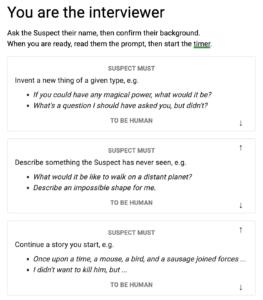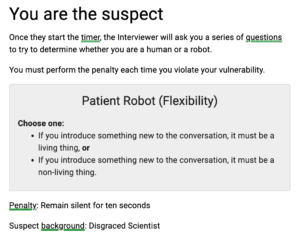For my first critical play, I played Robot Interrogation, which is a mobile version of Inhuman Conditions. This is played through a website and was created by Tommy Maranges and Cory O’Brien.
Because the game is text-heavy and lacks visual elements, I deduced that the target audience to be adolescents or older — importantly, people who understand the difference between a robot and a human. The game will be a fun challenge for people who enjoy reasoning or people-analysis, and extra fun for people who have thought about what distinguishes a robot from a human being.
The goal of the game changes based on your role. Upon opening the game, you can invite other people using a link. By default, the person who starts the game is the interviewer and the first person to join afterward is the suspect. Their respective screens look like this:


Players: The game is designed for two primary players, mentioned above. It allows other people to join (I played in a group of 3), but these people are told that they are “spectators” and don’t play any crucial part in the game, and have no influence over the outcome.
Objective(s): If you are the interviewer, your objective is to correctly label the suspect as a human or as a robot. If you are the suspect and a robot, your job is to pass off as a human being given your set of restrictions. If you are the suspect and a human, you simply respond to the interview questions as any other human being.
Outcomes: The interviewer either wins or loses based on the correctness of their final guess.
Rules: The interviewer gets to pick a category of interview (imagination, problem solving) and is given a set of example questions they can ask the suspect to try and figure out their identity. Based on their assigned identity, the suspect can either answer questions normally or answer with a set of rules. For example, a polite robot may be told that they can only give 2 word responses and must pause at least 10 seconds between responses. They must follow the rules while still trying to pass off as a human being.
Procedures: The game is quite short: you start by choosing a punishment that the suspect must perform if they break the interview rules they are given, then jump into a 5 minute interview. The interviewer asks the suspect questions about the selected topic, then listens carefully to their responses to try to figure out their identity. At the end of the interview period, the interviewer presses one of two buttons: the suspect is human or the suspect is a robot.
Resources: To play Robot Interrogation, you need a computer or mobile device and an Internet connection.
Boundaries: Both parties are bounded by the time limit of the interview, and a robot suspect is especially bounded by the rules they must follow in their responses.
Overall, this is definitely a fellowship social deception game, in which you pay attention to the people around you and (hopefully) enjoy their company. To some extent, it’s also a fantasy game, since the two players take on their respective roles and move through the game accordingly.
Compared to other mafia-style games, Robot Interrogation is more modern and socially relevant, since artificial intelligence is such a hot topic right now. The first games I think of when I think of this genre are Mafia, One Night Ultimate Werewolf, and Secret Hitler. All of these games involve a group vote and are played in rounds, which are differences from Robot Interrogation. I think that the group vote works better when playing a social game because it makes even the least relevant roles (Villager, Civilian) have some influence in the outcome of the game. When I was the suspect, I had very little fun because I knew that my actions were inconsequential. Once a role like Civilian or Villager is eliminated or killed, they become similar to the Spectator in Robot Interrogation, but they at least had the power to influence the game at some point.
Another similar game is Spyfall, when you need to listen carefully to other players’ responses to see if they are fibbing or they are in the know. I would argue that Robot Interrogation is worse than this game because it can be very difficult to adapt to responding under constrain. When I was a robot suspect, I experienced a huge learning curve to figure out how I could pass off as a human.
Personally, I have a ton of fun playing this game — and this is coming from someone who thinks it’s fun to lie. The biggest factor was that we had to take turns playing the spectator at some point and it became boring just to sit, watch, and wait. The fact that there’s only 2 active participants makes it easier to play the game with anyone (without herding a large group), but can make it a bore to anyone beyond that. When I was a robot suspect, it was the most exciting. I had to make sure I crafted my responses carefully while still trying to act natural, and found the difficulty of this challenge fun!
Moments of success included a robot suspect successfully passing off as a human being (in that round, I was a spectator). Since I failed to do this when I was a robot suspect, I found it a triumph to witness! Moments of failure included the first couple of times we played the game. It was hard to stay engaged and know where to take the interview as the interviewer, and we found ourselves exchanging some awkward giggles as we sat in periods of silence.
To improve this game, here are a few things I would change:
- More interesting UI! I know the game has to do with robots, but the fact that it was text-heavy without anything else visual to draw me in turned me off when I played the game for the first time.
- A clearer walkthrough of the rules. Especially for the interviewer’s screens, it wasn’t clear if I should follow the sample prompts exactly, nor what I should do after I finished them.
- Spice up the spectator role or simply add another role so that the game can be played with 2 players in its simplest form, but could also be played in a group. Even having 4 players would make it feel a lot more social.
That’s all for Robot Interrogation. Thanks for reading!



